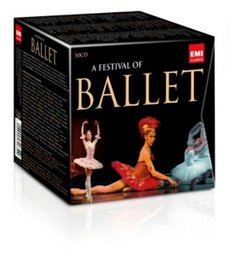CD Details
Synopsis
Album DescriptionA Festival of Ballet, a 50-CD box set, covers the whole range of ballet, from its origins as an integral part of the Baroque operas of Purcell and Rameau, through its establishment in the 18th and 19th centuries in France and Russia in the form that we now think of as `classical ballet', to the development of a more modern style -- including the concept of abstract ballets -- in the 20th century that found its flowering in the celebrated works of Fokine, Balanchine, Tudor, Ashton, MacMillan and many others. The set begins with substantial highlights from the three great Tchaikovsky ballets: Swan Lake, Sleeping Beauty and The Nutcracker, and then come more works by Russian composers such as Prokofiev, Glazunov, Shostakovich, Stravinsky and Khachaturian. The rest of the set consists of basically national groupings of composers -- mainly French, English, German and American -- until the last four CDs, which contain ballet music from operas, oratorios and plays. Many of the ballet scores are heard complete, but most of the full-length works are represented by highlights that cover all the best-known sections. Apart from the three Tchaikovsky ballets, other long works that have been highlighted include Giselle, Romeo and Juliet, Cinderella, Don Quixote, Coppélia, Sylvia and La Fille mal gardée. The recordings feature the world's greatest orchestras under many outstanding international conductors such as Herbert von Karajan, Riccardo Muti, André Previn and Sir Simon Rattle, as well as leading ballet experts like John Lanchbery, Barry Wordsworth, Terence Kern and Robert Irving. Also heard are authoritative recordings of ballet scores that use arrangements of music not originally written for the dance, conducted by the men who so skilfully put them together, like Sir Charles Mackerras (Pineapple Poll) and Manuel Rosenthal (Gaîté Parisienne). As well as all the most popular ballet music, the set includes some rarities of great interest, such as the first complete recording of John Antill's Corroboree (1950), a spectacular score that vividly portrays the primitive ceremonies and dances of the Australian aborigines, and Charles Koechlin's tone poem Les BandarLog that formed the bulk of the score for Antony Tudor's atmospheric 1967 ballet Shadowplay. Also heard here is Cole Porter's only classical ballet score, the 1923 work Within the Quota which, coincidently, was orchestrated by Charles Koechlin.
| |
CD Reviews
A super huge mixed bag Joseph Reichmann | Los Angeles | 05/14/2010 (4 out of 5 stars) "The box claims that it contains "over 150 ballets on 50 CDs". To be accurate the box should claim that is contains SELECTIONS from over 150 ballets. Many of the selections are less than 10 minutes while a few exceed 60 minutes. The track listings in the booklet take 84 pages!!! There are three types of ballets.
TRUE BALLETS: A composer and choreographer work together to create a completely new work. Among the true ballets in this set are Tchaikovsky (Swan Lake, Nutcracker, Sleeping Beauty), Stravinsky (Rite of Spring, Petrushka, Firebird, Pucinella), Prokofiev (Cinderella, Romeo and Julliet), Glazunov (Raymonda, The Seasons), Delibes (Coppelia, Sylvia), Adam (Giselle), Minkus (Don Quixote), Falla (Three Cornered Hat, Love the Magician), Vaughn Williams (Job), Bartok (Miraculous Mandarin), and Copland (Billy The Kid, Rodeo,and Appalachian Spring).
HALF BALLETS; An arranger, other than the composer, arranges bits and pieces from a composer's music, and works with a choregrapher to create a new ballet never imagined by the composer. Among the works included in this set are Sullivan (Pineapple Poll), Strauss (Graduation Ball), Offenbach (Gaite Parisienne), Chopin (Les Sylphides) Czerny (Etudes), and Rossini (Boitique Fantasque).
NON BALLETS; Here a choreographer sets dance steps to a piece of music that was never intended to be a ballet in the first place. These musical pieces are complete. Among those are Tchaikovsky (3rd and 2nd piano concertos and the 3rd symphony), Rimsky-Korsakov (Scheherazade), Britten (A Simple Symphony), Bizet, Symphony), Frank (Symphonic Variations), Elgar (Enigma Variations) and Stravinsky (Symphony in 3 Movements)
The Reordings are jammed full. They total over 60 hours. They are EMI recordings and the sound is acceptable to very good. Not all recordings are digital. Many are stereo and a few are mono.
The performances are good to excellent. The True Ballets are quite often conducted by ballet conductors who specialize in ballets. John Lanchbery, Robert Irving, and Charles Mackerras contribute good, but not great work. However, famous classical conductors (Previn in the Prokoviev, Rattle in the Stravinsky, and Slatkin in the Copland) contribute excellent performances. The Half Ballets are most often again conducted by the ballet specialists who contribute good but not superior work. The Non Ballets are conducted by classical conductors and are usually outstanding (Beecham in the Bizet, Muti in the Rimskky-Korsakov).
There are many additional items such as ballets you may never have heard of by Antill, Helsted, Paulli, Porter, Berners, Dutilleux, and Davies.
Should you buy this set? I cannot possibly list all the more than 150 ballets included in this set. How many of the included works do you already own, either the identical recordings or recordings by other conductors? Absent a copy of the booklet you will have to be taking a chance. There will be surprises and some disappointments. The price may be a deciding factor. The 50 CD set sells, at the time of this writing, for anywhere between $1.20 to $2.00 per disc GOOD LUCK.
" Festival of Ballet Zachary Rogg-Meltzer | NYC | 03/10/2010 (5 out of 5 stars) "The most complete and comprehensive ballet box set that you can buy. This set has everything. Comprised of 50 CDs, you get the full range from the origins in the 18th century up until today. Starts off with some Tchaikovsky (Nutcracker, Swan Lake, and Sleeping Beauty) and moves on to many other ballet nationalities and pieces. All pieces are performed by top orchestras such as the Berlin Philharmonic (conducted by Sir Simon Rattle). If you love ballet, buy this. It's as simple as that."
|

